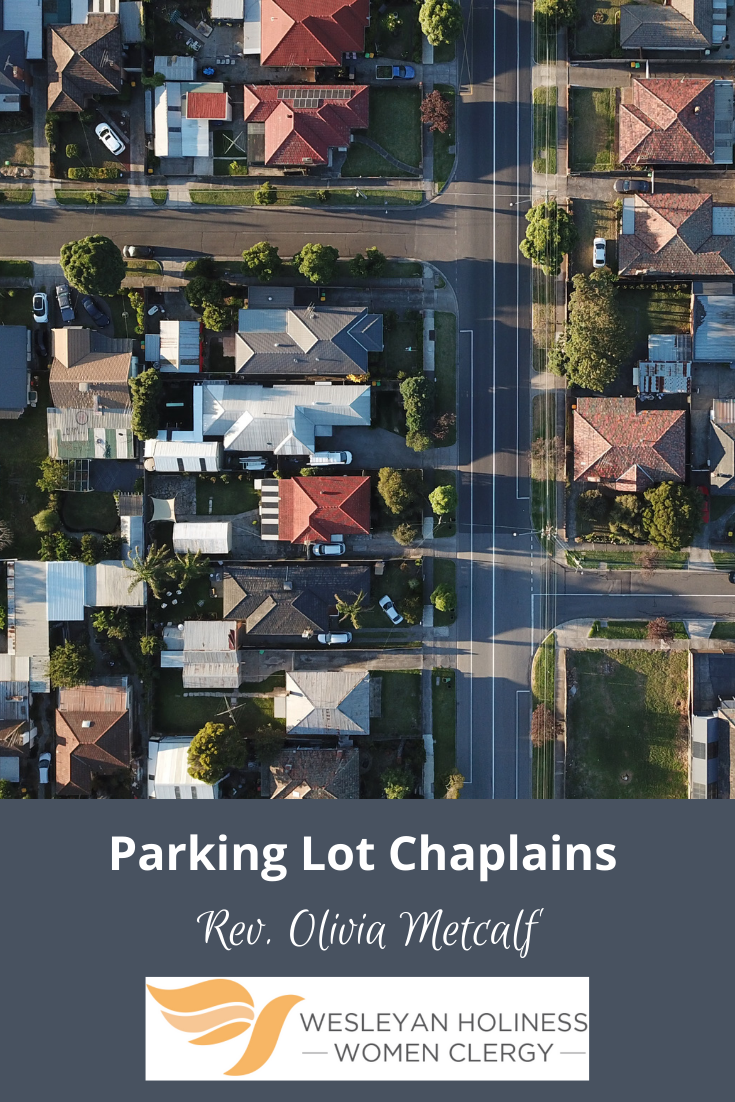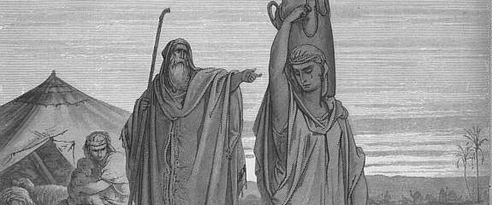Olivia Metcalf is a fourth generation ordained elder in the Church of the Nazarene. She is the District Superintendent of the Upstate New York District of the Church of the Nazarene. Prior to this role, she has co-pastored three churches with her husband Dustin and served alongside him as one of the University Chaplains at Northwest Nazarene University. She has served on the Nazarene Theological Seminary board of trustees for five years and on the Nazarene USA/Canada Women’s Clergy council for six. Her role with WHWC started on the planning committee six years ago and she moved to the board this year. Olivia has a deep passion for justice and is currently working on a DMin exploring the responsibility of the church in addressing the systemic issues that have led to mass incarceration. She loves traveling the world with her husband and two sons, Andrew and Ethan. She loves a good cup of coffee and deep discussion about how to live a cruciform life.
Parking Lot Chaplains
Rev. Olivia Metcalf • June 16, 2021 | WHWC
Being true to our calling in all sorts of places.
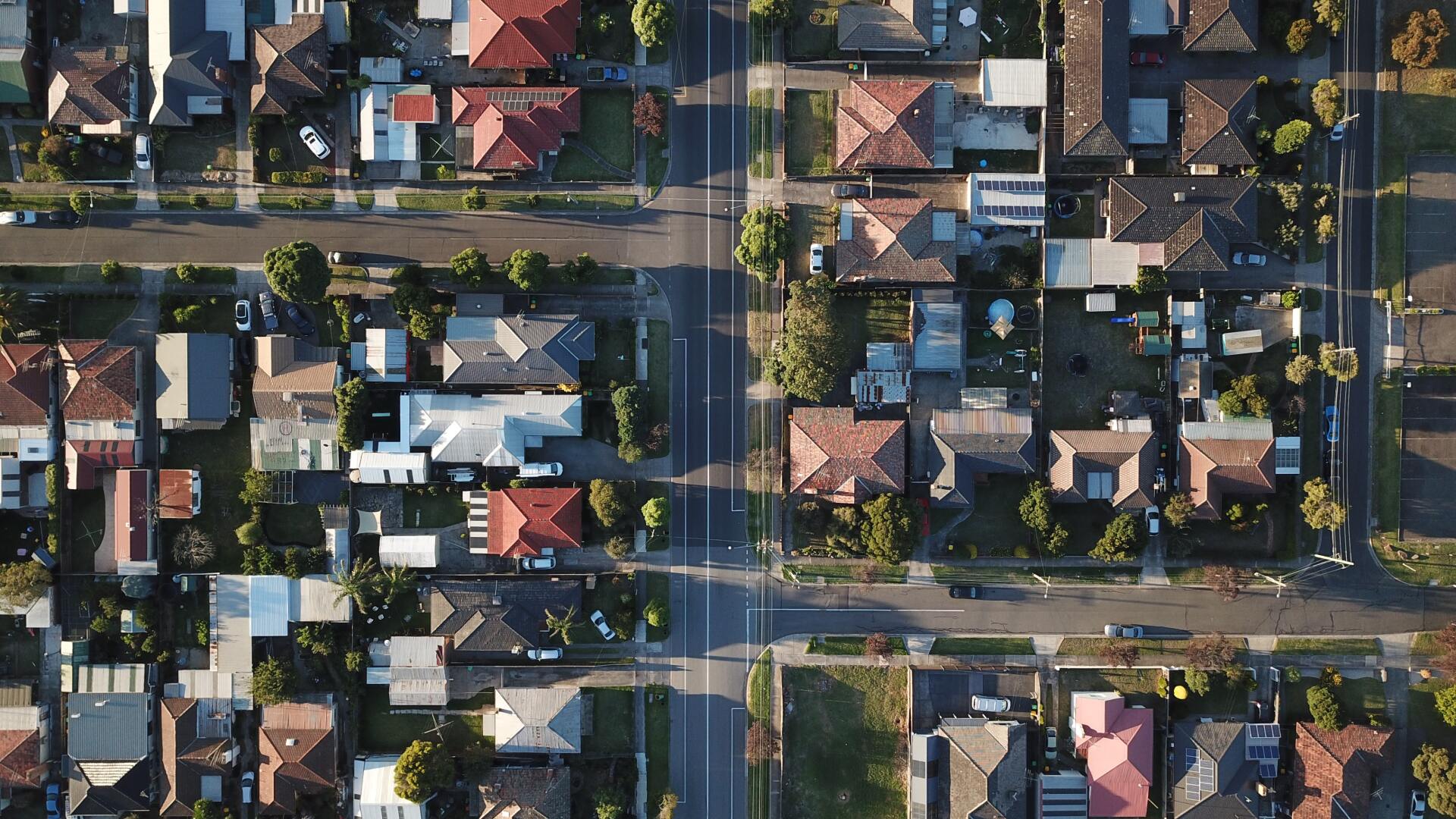
Recently I was moved by a tweet. I know, right?
Rev. Amber Picota (@irreverentreverend) wrote, “I am in the vet parking lot waiting to hear about my cat Buttermilk who has cut his leg and probably needs stitches (pray 4 him pls), & then this lady just came out on the phone w/ an empty carrier bawling her eyes out. Hold my latte, I’m bout to become the parking lot chaplain.”
Someone was in need. Someone saw the need. Love, care, grace, and mercy were offered.
This isn’t a blog post about expanding your ministry to the local Veterinarian Clinic, unless you feel so moved! It is rather a call for us to be fully present to where God is giving us ministry opportunities, even in the parking lots of our lives.
This is not a new message. You have probably heard it before. You might even be trying to live into it in 2021. Even so, I need to be reminded to be fully present to what God is already doing and to what God is calling me to do.
This idea is connected, I think, to the words that were spoken over me at my ordination from 2 Timothy 4:2. Maybe you heard them too. “Preach the word; be prepared in season and out of season; correct, rebuke and encourage--with great patience and careful instruction.”
Often we imagine this admonition from Paul to be about standing in a pulpit on a Sunday morning to deliver the sermon. It is, but it’s more. We might interpret what he says to his apprentice in ministry to be about when we are feeling it and when we’re not. It is, but it’s more. We might take the last few phrases to mean get your education, know your stuff, be sure to speak up against what separates us from God, ourselves, one another, and creation. It is, but it’s more.
We often have too small an imagination for what we have been called to as ministers of the Gospel. We need to be “Parking Lot Chaplains.” This can be in the literal parking lots of our lives, but what I am trying to get across is that we need to be true to our calling in all sorts of places.
Here are three questions to help us think about this idea.
Am I Out and About?
If we are only spending time inside our churches, we are missing out on what we are called to do. I have found in all of my ministry assignments that I need to be out and about in my community.
It can be easy to fill all the hours of the week, and more, with ministry inside the church. There is always more to do. But that reality shouldn’t be what guides us. We are called by a God who isn’t held within the walls of our church buildings or in our Zoom waiting rooms.
The pandemic made things more challenging. It showed us we need to be thinking of creative ways to be out and about. Have you gotten to know the teachers and administrators at the school nearest your church? Have you grabbed a cup of coffee and set up a Google Meet with anyone from the church down the street? Have you searched the demographics of the neighborhood you are situated in, walked the streets of your town, paid attention to where people gather, signed up to volunteer at one of the nonprofits in your community?
We need to be out and about so we can see where God is at work. I hope we aren’t too focused on our territory, our own emphases, our own ministry that we miss opportunities to link up with others. We would be stronger, more effective, and more well rounded as Gospel bringers if we didn’t do this alone.
Out and about can also refer to the ordinary activities of our lives. When I was a young pastor, fresh out of Seminary, with a toddler and a nursing baby, I remember feeling like I wasn’t getting to do ministry like I was “supposed” to and not being the best mother I was “supposed” to be. It was in this unique time of life and ministry I began the practice of Breath Prayers. This ancient discipline of choosing a phrase or Scripture to pray many times throughout the day transformed that time.
It continues to be a practice that keeps me connected to God. Here is what I prayed: “I’m Yours, Lord. Do with me what you will.” I would repeat this phrase in the parking lot at the grocery store to set my heart and mind on being present. Guess what? I found plenty of opportunities to be a minister. I didn’t wear a name tag that said “Grocery Store Chaplain,” I just made sure that I stayed in tune with God and stayed open to others.
Being out and about can be formalized ministry partnerships and it can be informal actions that fill your cup and bless your neighbor.
Are we out and about?
At What Table Do I Sit?
I am on a few boards that give me the opportunity to have a voice, to gain experience in leadership, and to make decisions for organizations I care about. What if being a parking lot chaplain at the tables of power I am privy to became about advocating for diversity and inclusion? What if I used my seat to amplify the voices of others who are underrepresented in those spaces--women, people of color, youth?
What if when those who are often tokenized sat next to me I really listened, partnered with them, and sought to dismantle the structures that often discriminate and oppress even in the church? What if I was given the opportunity to give up my seat so someone that is too often kept on the periphery was able to find a place?
One of the things I am learning from my sisters of color is that as we seek to dismantle the structures that perpetuate racism and oppression we must be ready to do the hard work this takes. Too often we think we have done good work by elevating a person of color to a place of leadership only to fail to listen to them, to continue to tokenize them, and to perpetuate the sorts of behaviors we are trying to break down.
It is unfair for us to invite people of color to the table and not to do the hard work that those of us who are white need to do to recognize our own complicity in the oppression Jesus said he came to end. There are many salient calls for people of color to stop coming to white religious tables to be abused. We need these people, with their faith, experiences, and expertise at any table where we sit.
Those of us who are white also need to stop imagining all the tables belong to us and all the invitations are for us to give. This requires those of us in the majority white culture in the United States to listen well, to repent, to relinquish power, and to champion change in our organizations.*
It isn’t just the tables of privilege that matter. Before COVID-19 I sat around tables with female inmates. Part of my ministry at the University I serve has grown out of my own passion for decarceration and justice reform in our nation. This would take me weekly to sit in really uncomfortable chairs, in really barren places, with really broken women.
Often at tables like the ones in the prison library we can believe we come with the wisdom and the hope and something to give. Don’t hear me say we have nothing to offer in these situations. The problem is we often believe we are the only ones with something to offer and there is nothing for us to learn.
I have experienced personal, spiritual, vocational, and lasting transformation by what has been given to me around those tables. I have learned things no other teacher could have taught me. I have been blessed in ways I didn’t know I needed blessing. I have been moved, humbled, and put in my place at that table.
To be the minister I have been called to be, I have needed to be fully present at that table and to those women so I could be ministered to. I have sought to obey God’s calling to visit the prisoner and have learned keenly that visitation isn’t merely for the incarcerated it is also for my transformation. Choosing to become proximate to those who are different from us, being open and ready to learn and listen, seeing people as made in the image of God will make any place a holy place. I don’t bring Christ into the prison, He is already there. I just have the privilege of partnering with what the Spirit is already at work doing.
At what tables do we sit?
Where Could I Be?
People will tell you where you should be, there are places you have to be, and there are locations you want to be.
A practice that will help us stay true to the Mission of God is to ask in prayer, “Where could I be that I currently am not?” This is of course scary. God might call us to places we don’t want to go. God might invite us to step out in faith. God might show us a need we don’t feel equipped to meet.
However, if there is one thing I know from the 18 years I have been pastoring is when God calls God provides. You might already be feeling a stirring in your heart you have been pushing down. You might know of a need but have gone through the pros and cons and decided it won’t work. You might be on your knees right now praying for courage to obey. Wherever you are, hold tight to the presence of God with us. There is great joy in following Jesus wherever He leads.
One of the comments to the tweet above is one pastor’s answer to “Where could I be?” Monica Mowdy (@monicamowdy) wrote, “I have a deal worked out with a local vet down the road from the church and I can pray with people when they have to put their animals down. It might be one of the most holy things I do as a pastor.”
Where could we be?
Our Calling
Being open to God and to others will change us and change the world around us. Parking lot chaplains are desperately needed in this world—faithful ministers who are fully present, actively looking, and prayerfully acting to bring light and life right where they are.
Can we see the empty pet carriers all around us? Can we set down our latte and minister in surprising places? Can we recognize the tears of a suffering world and act?
“Preach the word; be prepared in season and out of season; correct, rebuke and encourage--with great patience and careful instruction.” Maybe this will be in the four walls of your church or in a parking lot somewhere. Hopefully it will be both! However it happens, may God be glorified as we answer God’s call.
*For a great book to understand this more, check out I’m Still Here by Austin Channing Brown
Enjoyed this article? Connect with us on one of our social media platforms. Share it and forward it to a friend:
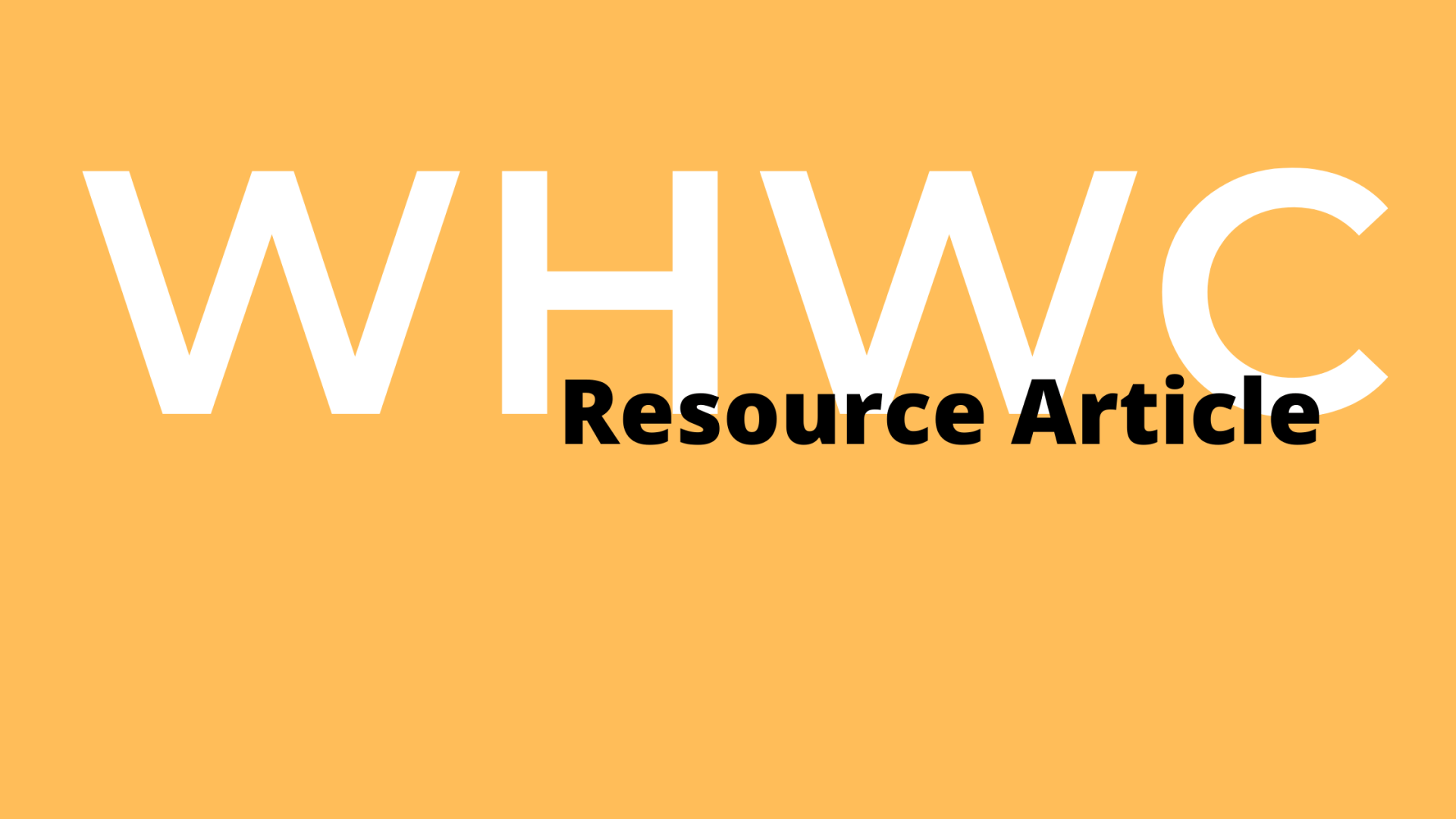
Wesleyan Holiness has a rich and diverse history of women empowered by the Holy Spirit following God in obedience to Him, blocking out the voices of those who didn't embrace or encourage women preachers. Each one of them are the women whose shoulders we stand upon, making way for the next generation of women pastors coming up behind us.
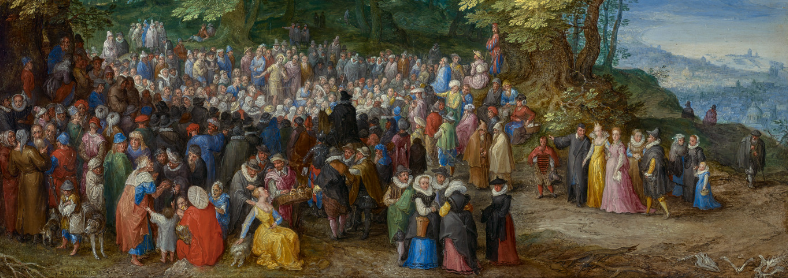
The wonderfully freeing truth we have in the Beatitudes is that they are not a checklist of to-dos and rules to hem us in, keep us in line, or that we must check off. The Beatitudes are words given to us as grace, dripping like honey from a honeycomb with blessing and hope in a desperate and broken world.


